DCU@PNU Entrepreneurship Essay: Opportunity Creation or Discovery?
VerifiedAdded on 2022/10/08
|9
|2273
|20
Essay
AI Summary
This essay critically examines the debate surrounding the origins of entrepreneurial opportunities, exploring whether they are created or discovered. It begins with an introduction that frames the core question and outlines the essay's structure. The essay then delves into the theoretical foundations of opportunity recognition, contrasting the discovery and creation theories. It provides a critical evaluation of the origins of opportunities, drawing on various research and studies. The essay analyzes the implications of both theories and provides evidence to support the arguments. It discusses the factors that influence opportunity recognition and highlights the importance of knowledge, experience, and cognitive frameworks. The essay concludes by synthesizing the key arguments and offering a well-supported answer to the central question, drawing on academic journals and research.
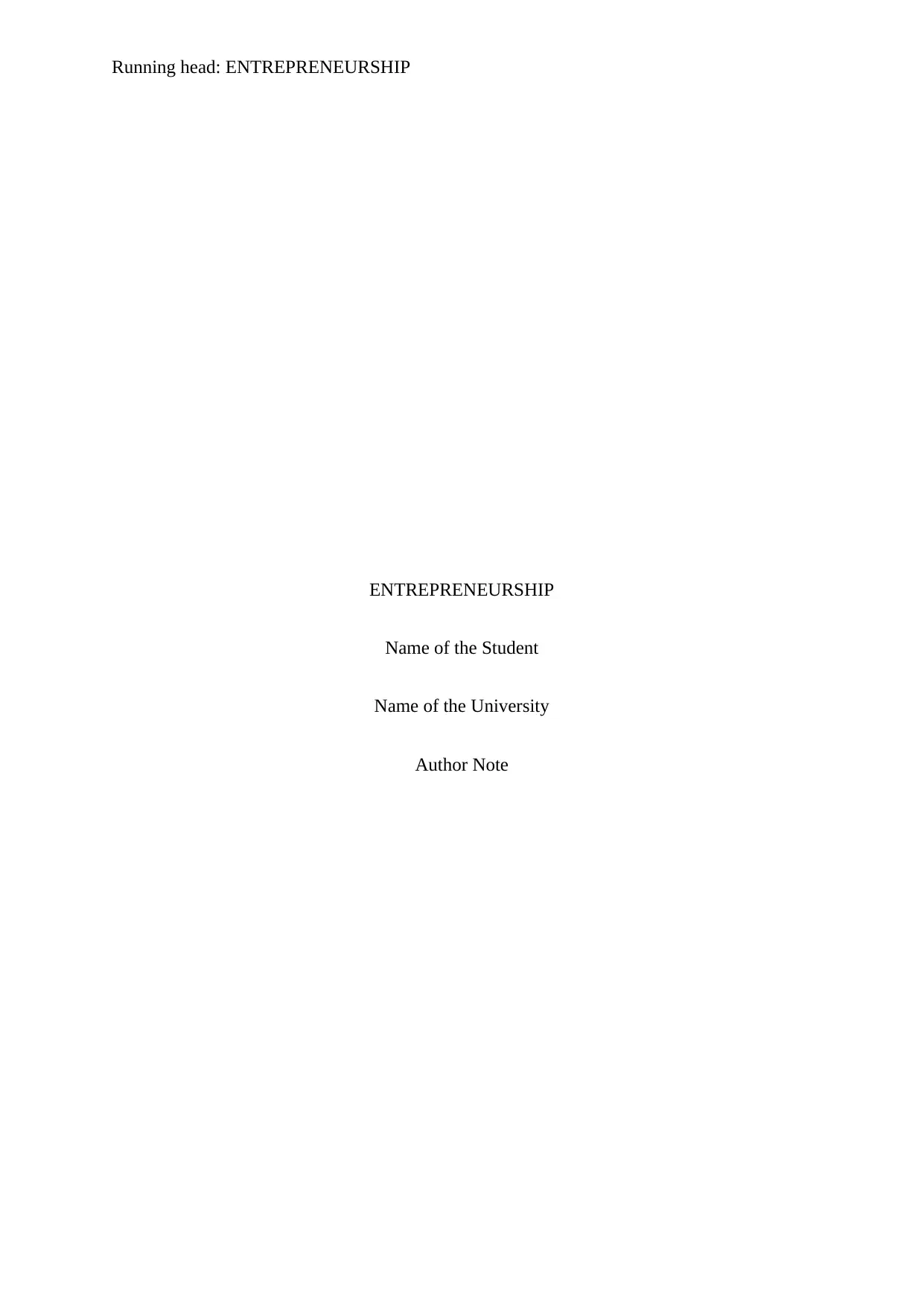
Running head: ENTREPRENEURSHIP
ENTREPRENEURSHIP
Name of the Student
Name of the University
Author Note
ENTREPRENEURSHIP
Name of the Student
Name of the University
Author Note
Paraphrase This Document
Need a fresh take? Get an instant paraphrase of this document with our AI Paraphraser
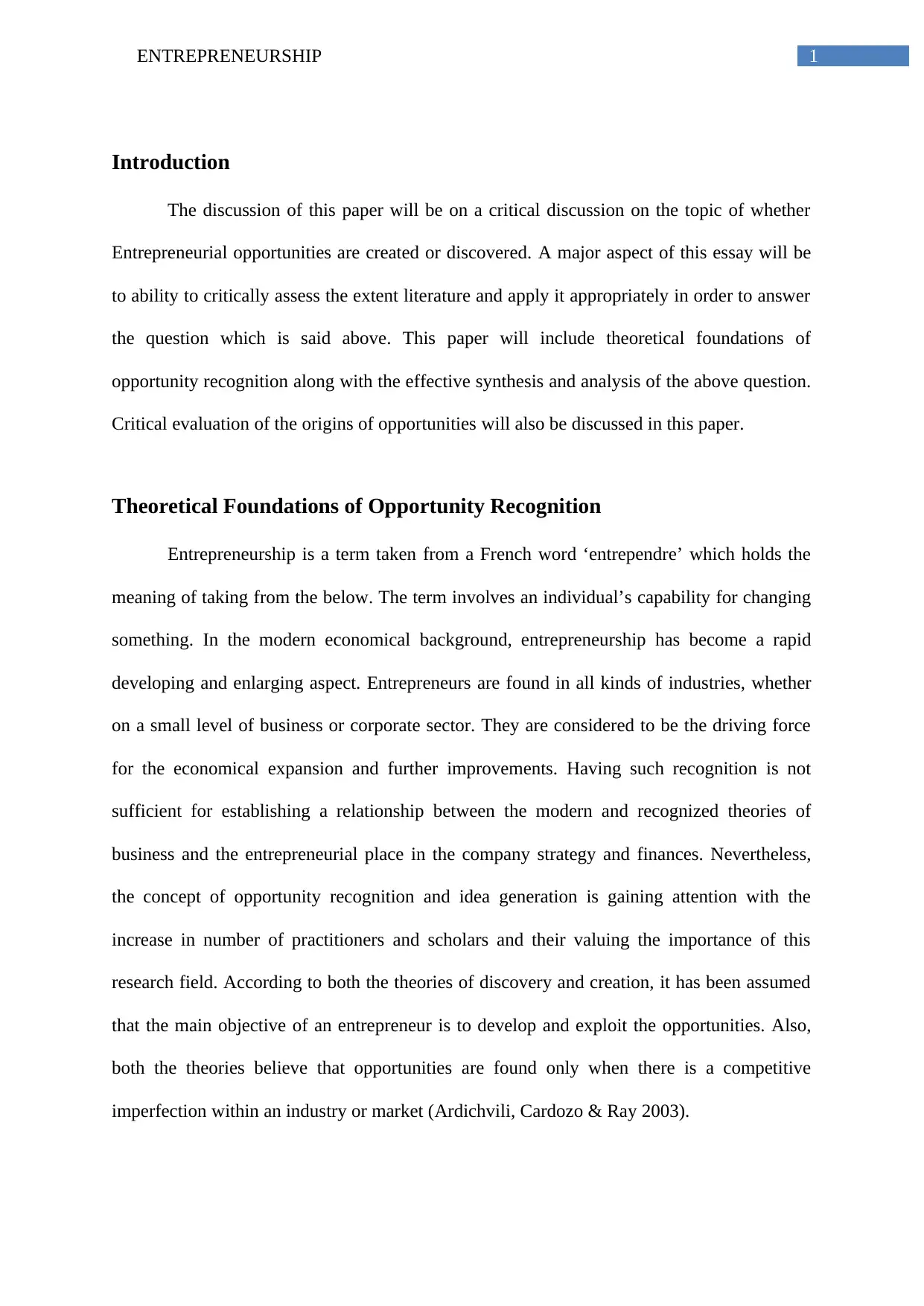
1ENTREPRENEURSHIP
Introduction
The discussion of this paper will be on a critical discussion on the topic of whether
Entrepreneurial opportunities are created or discovered. A major aspect of this essay will be
to ability to critically assess the extent literature and apply it appropriately in order to answer
the question which is said above. This paper will include theoretical foundations of
opportunity recognition along with the effective synthesis and analysis of the above question.
Critical evaluation of the origins of opportunities will also be discussed in this paper.
Theoretical Foundations of Opportunity Recognition
Entrepreneurship is a term taken from a French word ‘entrependre’ which holds the
meaning of taking from the below. The term involves an individual’s capability for changing
something. In the modern economical background, entrepreneurship has become a rapid
developing and enlarging aspect. Entrepreneurs are found in all kinds of industries, whether
on a small level of business or corporate sector. They are considered to be the driving force
for the economical expansion and further improvements. Having such recognition is not
sufficient for establishing a relationship between the modern and recognized theories of
business and the entrepreneurial place in the company strategy and finances. Nevertheless,
the concept of opportunity recognition and idea generation is gaining attention with the
increase in number of practitioners and scholars and their valuing the importance of this
research field. According to both the theories of discovery and creation, it has been assumed
that the main objective of an entrepreneur is to develop and exploit the opportunities. Also,
both the theories believe that opportunities are found only when there is a competitive
imperfection within an industry or market (Ardichvili, Cardozo & Ray 2003).
Introduction
The discussion of this paper will be on a critical discussion on the topic of whether
Entrepreneurial opportunities are created or discovered. A major aspect of this essay will be
to ability to critically assess the extent literature and apply it appropriately in order to answer
the question which is said above. This paper will include theoretical foundations of
opportunity recognition along with the effective synthesis and analysis of the above question.
Critical evaluation of the origins of opportunities will also be discussed in this paper.
Theoretical Foundations of Opportunity Recognition
Entrepreneurship is a term taken from a French word ‘entrependre’ which holds the
meaning of taking from the below. The term involves an individual’s capability for changing
something. In the modern economical background, entrepreneurship has become a rapid
developing and enlarging aspect. Entrepreneurs are found in all kinds of industries, whether
on a small level of business or corporate sector. They are considered to be the driving force
for the economical expansion and further improvements. Having such recognition is not
sufficient for establishing a relationship between the modern and recognized theories of
business and the entrepreneurial place in the company strategy and finances. Nevertheless,
the concept of opportunity recognition and idea generation is gaining attention with the
increase in number of practitioners and scholars and their valuing the importance of this
research field. According to both the theories of discovery and creation, it has been assumed
that the main objective of an entrepreneur is to develop and exploit the opportunities. Also,
both the theories believe that opportunities are found only when there is a competitive
imperfection within an industry or market (Ardichvili, Cardozo & Ray 2003).
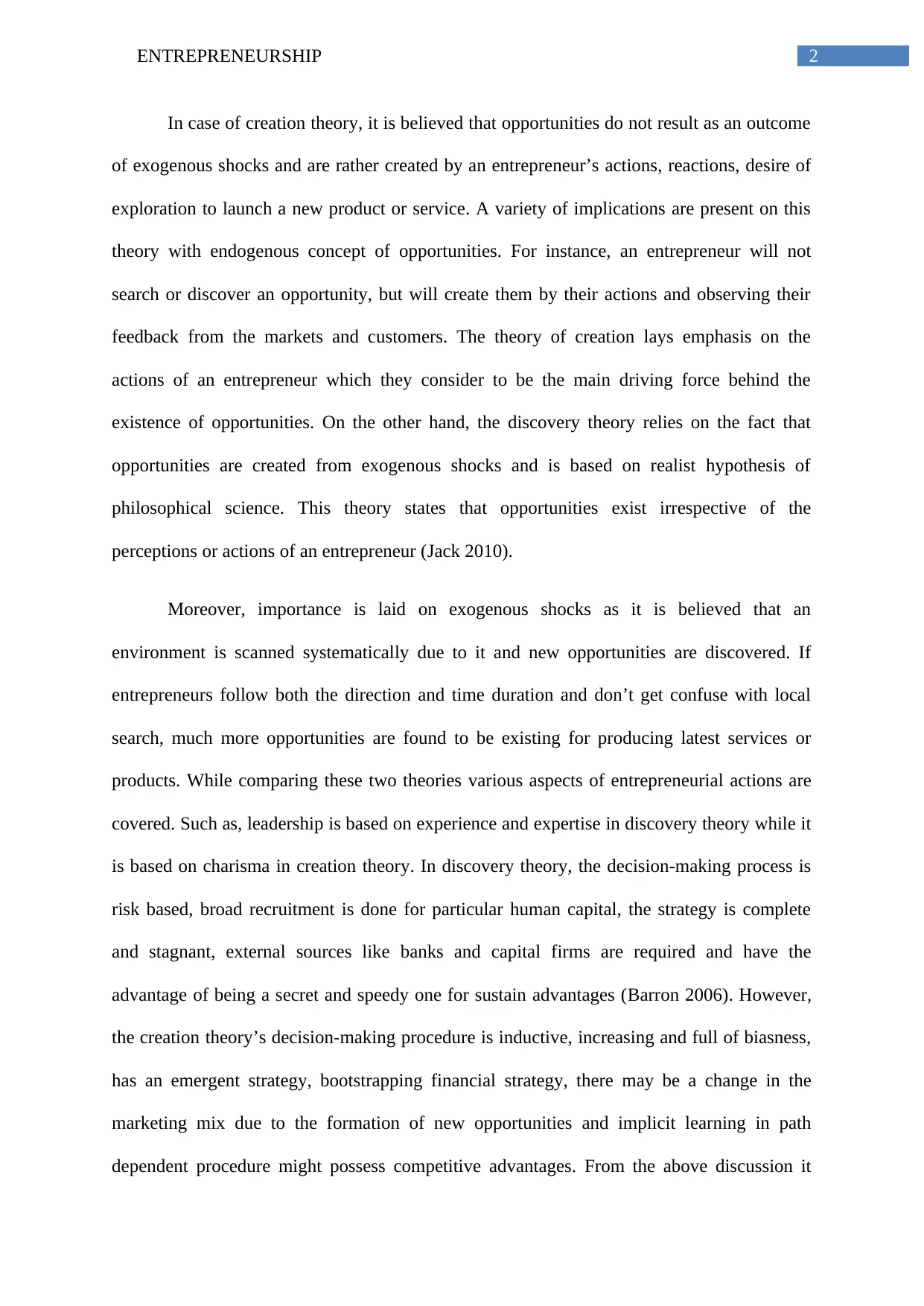
2ENTREPRENEURSHIP
In case of creation theory, it is believed that opportunities do not result as an outcome
of exogenous shocks and are rather created by an entrepreneur’s actions, reactions, desire of
exploration to launch a new product or service. A variety of implications are present on this
theory with endogenous concept of opportunities. For instance, an entrepreneur will not
search or discover an opportunity, but will create them by their actions and observing their
feedback from the markets and customers. The theory of creation lays emphasis on the
actions of an entrepreneur which they consider to be the main driving force behind the
existence of opportunities. On the other hand, the discovery theory relies on the fact that
opportunities are created from exogenous shocks and is based on realist hypothesis of
philosophical science. This theory states that opportunities exist irrespective of the
perceptions or actions of an entrepreneur (Jack 2010).
Moreover, importance is laid on exogenous shocks as it is believed that an
environment is scanned systematically due to it and new opportunities are discovered. If
entrepreneurs follow both the direction and time duration and don’t get confuse with local
search, much more opportunities are found to be existing for producing latest services or
products. While comparing these two theories various aspects of entrepreneurial actions are
covered. Such as, leadership is based on experience and expertise in discovery theory while it
is based on charisma in creation theory. In discovery theory, the decision-making process is
risk based, broad recruitment is done for particular human capital, the strategy is complete
and stagnant, external sources like banks and capital firms are required and have the
advantage of being a secret and speedy one for sustain advantages (Barron 2006). However,
the creation theory’s decision-making procedure is inductive, increasing and full of biasness,
has an emergent strategy, bootstrapping financial strategy, there may be a change in the
marketing mix due to the formation of new opportunities and implicit learning in path
dependent procedure might possess competitive advantages. From the above discussion it
In case of creation theory, it is believed that opportunities do not result as an outcome
of exogenous shocks and are rather created by an entrepreneur’s actions, reactions, desire of
exploration to launch a new product or service. A variety of implications are present on this
theory with endogenous concept of opportunities. For instance, an entrepreneur will not
search or discover an opportunity, but will create them by their actions and observing their
feedback from the markets and customers. The theory of creation lays emphasis on the
actions of an entrepreneur which they consider to be the main driving force behind the
existence of opportunities. On the other hand, the discovery theory relies on the fact that
opportunities are created from exogenous shocks and is based on realist hypothesis of
philosophical science. This theory states that opportunities exist irrespective of the
perceptions or actions of an entrepreneur (Jack 2010).
Moreover, importance is laid on exogenous shocks as it is believed that an
environment is scanned systematically due to it and new opportunities are discovered. If
entrepreneurs follow both the direction and time duration and don’t get confuse with local
search, much more opportunities are found to be existing for producing latest services or
products. While comparing these two theories various aspects of entrepreneurial actions are
covered. Such as, leadership is based on experience and expertise in discovery theory while it
is based on charisma in creation theory. In discovery theory, the decision-making process is
risk based, broad recruitment is done for particular human capital, the strategy is complete
and stagnant, external sources like banks and capital firms are required and have the
advantage of being a secret and speedy one for sustain advantages (Barron 2006). However,
the creation theory’s decision-making procedure is inductive, increasing and full of biasness,
has an emergent strategy, bootstrapping financial strategy, there may be a change in the
marketing mix due to the formation of new opportunities and implicit learning in path
dependent procedure might possess competitive advantages. From the above discussion it
⊘ This is a preview!⊘
Do you want full access?
Subscribe today to unlock all pages.

Trusted by 1+ million students worldwide
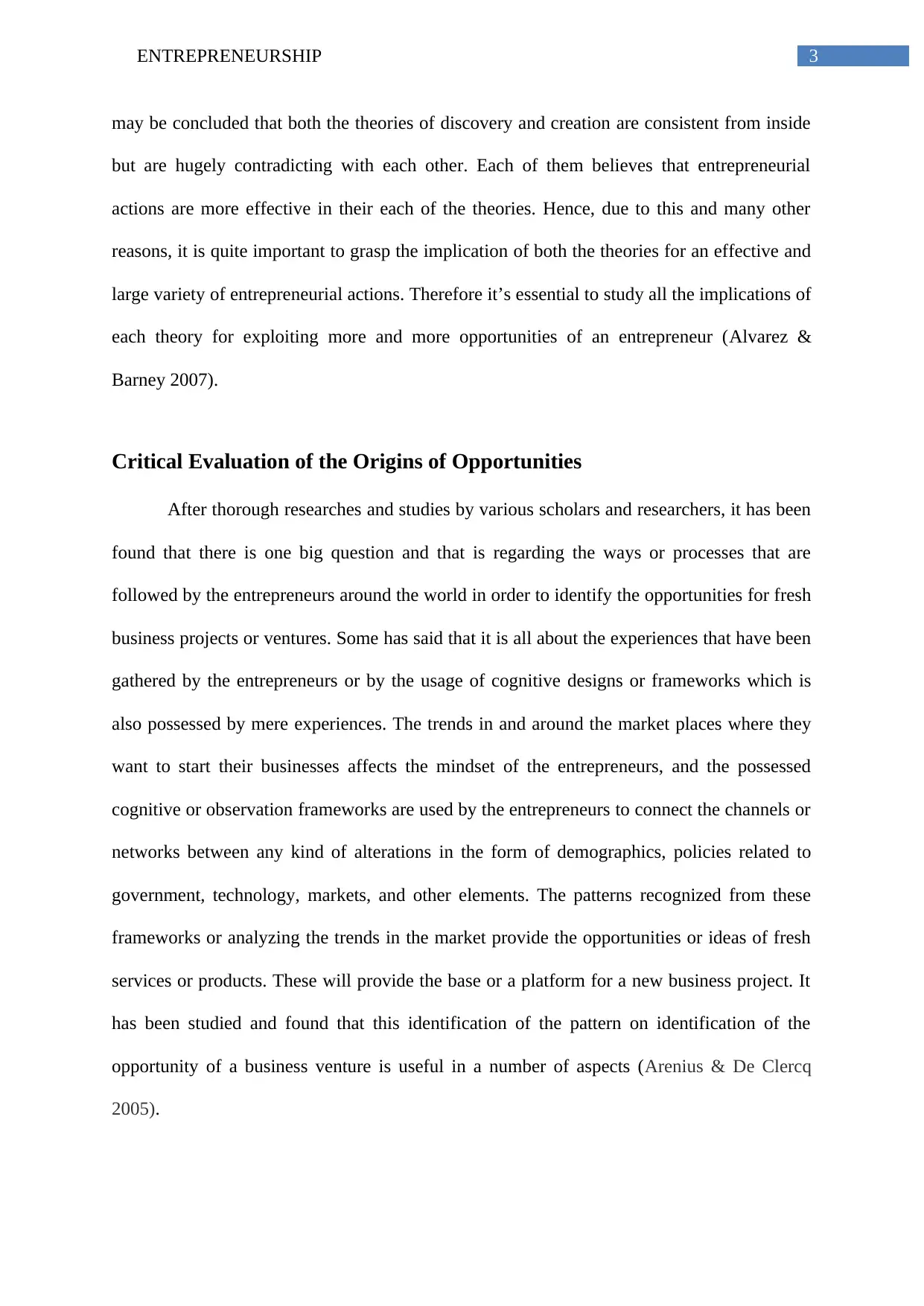
3ENTREPRENEURSHIP
may be concluded that both the theories of discovery and creation are consistent from inside
but are hugely contradicting with each other. Each of them believes that entrepreneurial
actions are more effective in their each of the theories. Hence, due to this and many other
reasons, it is quite important to grasp the implication of both the theories for an effective and
large variety of entrepreneurial actions. Therefore it’s essential to study all the implications of
each theory for exploiting more and more opportunities of an entrepreneur (Alvarez &
Barney 2007).
Critical Evaluation of the Origins of Opportunities
After thorough researches and studies by various scholars and researchers, it has been
found that there is one big question and that is regarding the ways or processes that are
followed by the entrepreneurs around the world in order to identify the opportunities for fresh
business projects or ventures. Some has said that it is all about the experiences that have been
gathered by the entrepreneurs or by the usage of cognitive designs or frameworks which is
also possessed by mere experiences. The trends in and around the market places where they
want to start their businesses affects the mindset of the entrepreneurs, and the possessed
cognitive or observation frameworks are used by the entrepreneurs to connect the channels or
networks between any kind of alterations in the form of demographics, policies related to
government, technology, markets, and other elements. The patterns recognized from these
frameworks or analyzing the trends in the market provide the opportunities or ideas of fresh
services or products. These will provide the base or a platform for a new business project. It
has been studied and found that this identification of the pattern on identification of the
opportunity of a business venture is useful in a number of aspects (Arenius & De Clercq
2005).
may be concluded that both the theories of discovery and creation are consistent from inside
but are hugely contradicting with each other. Each of them believes that entrepreneurial
actions are more effective in their each of the theories. Hence, due to this and many other
reasons, it is quite important to grasp the implication of both the theories for an effective and
large variety of entrepreneurial actions. Therefore it’s essential to study all the implications of
each theory for exploiting more and more opportunities of an entrepreneur (Alvarez &
Barney 2007).
Critical Evaluation of the Origins of Opportunities
After thorough researches and studies by various scholars and researchers, it has been
found that there is one big question and that is regarding the ways or processes that are
followed by the entrepreneurs around the world in order to identify the opportunities for fresh
business projects or ventures. Some has said that it is all about the experiences that have been
gathered by the entrepreneurs or by the usage of cognitive designs or frameworks which is
also possessed by mere experiences. The trends in and around the market places where they
want to start their businesses affects the mindset of the entrepreneurs, and the possessed
cognitive or observation frameworks are used by the entrepreneurs to connect the channels or
networks between any kind of alterations in the form of demographics, policies related to
government, technology, markets, and other elements. The patterns recognized from these
frameworks or analyzing the trends in the market provide the opportunities or ideas of fresh
services or products. These will provide the base or a platform for a new business project. It
has been studied and found that this identification of the pattern on identification of the
opportunity of a business venture is useful in a number of aspects (Arenius & De Clercq
2005).
Paraphrase This Document
Need a fresh take? Get an instant paraphrase of this document with our AI Paraphraser
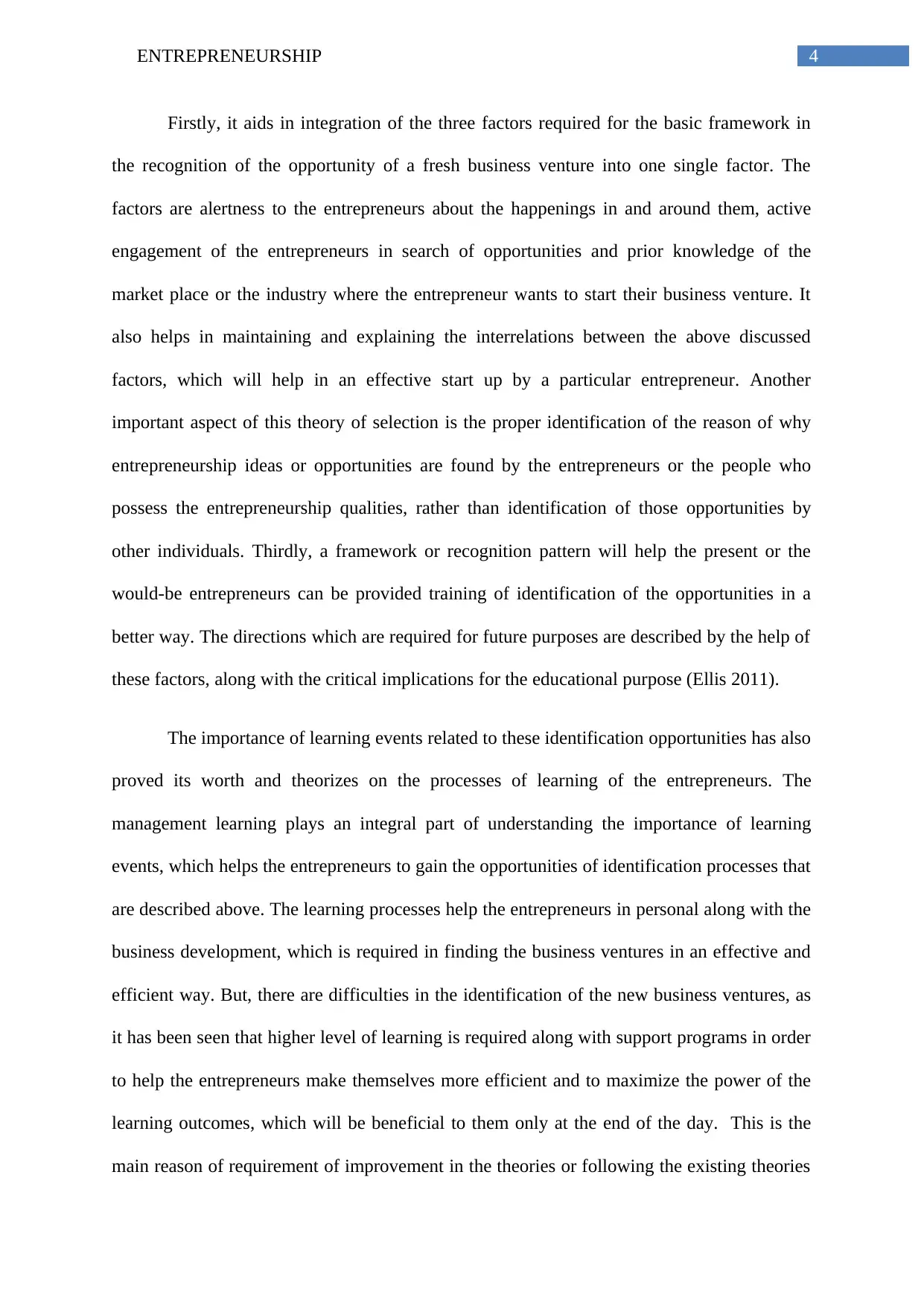
4ENTREPRENEURSHIP
Firstly, it aids in integration of the three factors required for the basic framework in
the recognition of the opportunity of a fresh business venture into one single factor. The
factors are alertness to the entrepreneurs about the happenings in and around them, active
engagement of the entrepreneurs in search of opportunities and prior knowledge of the
market place or the industry where the entrepreneur wants to start their business venture. It
also helps in maintaining and explaining the interrelations between the above discussed
factors, which will help in an effective start up by a particular entrepreneur. Another
important aspect of this theory of selection is the proper identification of the reason of why
entrepreneurship ideas or opportunities are found by the entrepreneurs or the people who
possess the entrepreneurship qualities, rather than identification of those opportunities by
other individuals. Thirdly, a framework or recognition pattern will help the present or the
would-be entrepreneurs can be provided training of identification of the opportunities in a
better way. The directions which are required for future purposes are described by the help of
these factors, along with the critical implications for the educational purpose (Ellis 2011).
The importance of learning events related to these identification opportunities has also
proved its worth and theorizes on the processes of learning of the entrepreneurs. The
management learning plays an integral part of understanding the importance of learning
events, which helps the entrepreneurs to gain the opportunities of identification processes that
are described above. The learning processes help the entrepreneurs in personal along with the
business development, which is required in finding the business ventures in an effective and
efficient way. But, there are difficulties in the identification of the new business ventures, as
it has been seen that higher level of learning is required along with support programs in order
to help the entrepreneurs make themselves more efficient and to maximize the power of the
learning outcomes, which will be beneficial to them only at the end of the day. This is the
main reason of requirement of improvement in the theories or following the existing theories
Firstly, it aids in integration of the three factors required for the basic framework in
the recognition of the opportunity of a fresh business venture into one single factor. The
factors are alertness to the entrepreneurs about the happenings in and around them, active
engagement of the entrepreneurs in search of opportunities and prior knowledge of the
market place or the industry where the entrepreneur wants to start their business venture. It
also helps in maintaining and explaining the interrelations between the above discussed
factors, which will help in an effective start up by a particular entrepreneur. Another
important aspect of this theory of selection is the proper identification of the reason of why
entrepreneurship ideas or opportunities are found by the entrepreneurs or the people who
possess the entrepreneurship qualities, rather than identification of those opportunities by
other individuals. Thirdly, a framework or recognition pattern will help the present or the
would-be entrepreneurs can be provided training of identification of the opportunities in a
better way. The directions which are required for future purposes are described by the help of
these factors, along with the critical implications for the educational purpose (Ellis 2011).
The importance of learning events related to these identification opportunities has also
proved its worth and theorizes on the processes of learning of the entrepreneurs. The
management learning plays an integral part of understanding the importance of learning
events, which helps the entrepreneurs to gain the opportunities of identification processes that
are described above. The learning processes help the entrepreneurs in personal along with the
business development, which is required in finding the business ventures in an effective and
efficient way. But, there are difficulties in the identification of the new business ventures, as
it has been seen that higher level of learning is required along with support programs in order
to help the entrepreneurs make themselves more efficient and to maximize the power of the
learning outcomes, which will be beneficial to them only at the end of the day. This is the
main reason of requirement of improvement in the theories or following the existing theories
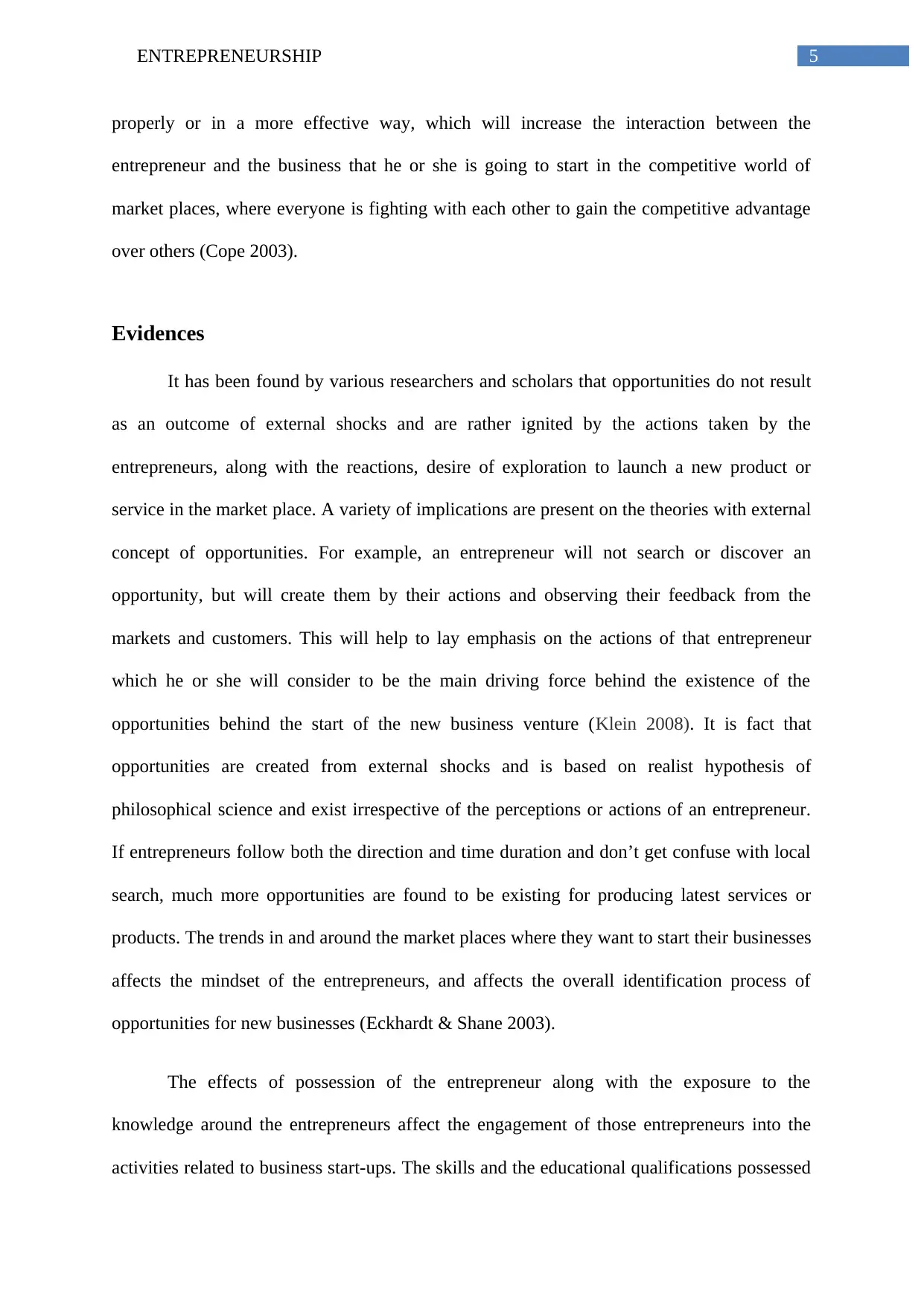
5ENTREPRENEURSHIP
properly or in a more effective way, which will increase the interaction between the
entrepreneur and the business that he or she is going to start in the competitive world of
market places, where everyone is fighting with each other to gain the competitive advantage
over others (Cope 2003).
Evidences
It has been found by various researchers and scholars that opportunities do not result
as an outcome of external shocks and are rather ignited by the actions taken by the
entrepreneurs, along with the reactions, desire of exploration to launch a new product or
service in the market place. A variety of implications are present on the theories with external
concept of opportunities. For example, an entrepreneur will not search or discover an
opportunity, but will create them by their actions and observing their feedback from the
markets and customers. This will help to lay emphasis on the actions of that entrepreneur
which he or she will consider to be the main driving force behind the existence of the
opportunities behind the start of the new business venture (Klein 2008). It is fact that
opportunities are created from external shocks and is based on realist hypothesis of
philosophical science and exist irrespective of the perceptions or actions of an entrepreneur.
If entrepreneurs follow both the direction and time duration and don’t get confuse with local
search, much more opportunities are found to be existing for producing latest services or
products. The trends in and around the market places where they want to start their businesses
affects the mindset of the entrepreneurs, and affects the overall identification process of
opportunities for new businesses (Eckhardt & Shane 2003).
The effects of possession of the entrepreneur along with the exposure to the
knowledge around the entrepreneurs affect the engagement of those entrepreneurs into the
activities related to business start-ups. The skills and the educational qualifications possessed
properly or in a more effective way, which will increase the interaction between the
entrepreneur and the business that he or she is going to start in the competitive world of
market places, where everyone is fighting with each other to gain the competitive advantage
over others (Cope 2003).
Evidences
It has been found by various researchers and scholars that opportunities do not result
as an outcome of external shocks and are rather ignited by the actions taken by the
entrepreneurs, along with the reactions, desire of exploration to launch a new product or
service in the market place. A variety of implications are present on the theories with external
concept of opportunities. For example, an entrepreneur will not search or discover an
opportunity, but will create them by their actions and observing their feedback from the
markets and customers. This will help to lay emphasis on the actions of that entrepreneur
which he or she will consider to be the main driving force behind the existence of the
opportunities behind the start of the new business venture (Klein 2008). It is fact that
opportunities are created from external shocks and is based on realist hypothesis of
philosophical science and exist irrespective of the perceptions or actions of an entrepreneur.
If entrepreneurs follow both the direction and time duration and don’t get confuse with local
search, much more opportunities are found to be existing for producing latest services or
products. The trends in and around the market places where they want to start their businesses
affects the mindset of the entrepreneurs, and affects the overall identification process of
opportunities for new businesses (Eckhardt & Shane 2003).
The effects of possession of the entrepreneur along with the exposure to the
knowledge around the entrepreneurs affect the engagement of those entrepreneurs into the
activities related to business start-ups. The skills and the educational qualifications possessed
⊘ This is a preview!⊘
Do you want full access?
Subscribe today to unlock all pages.

Trusted by 1+ million students worldwide
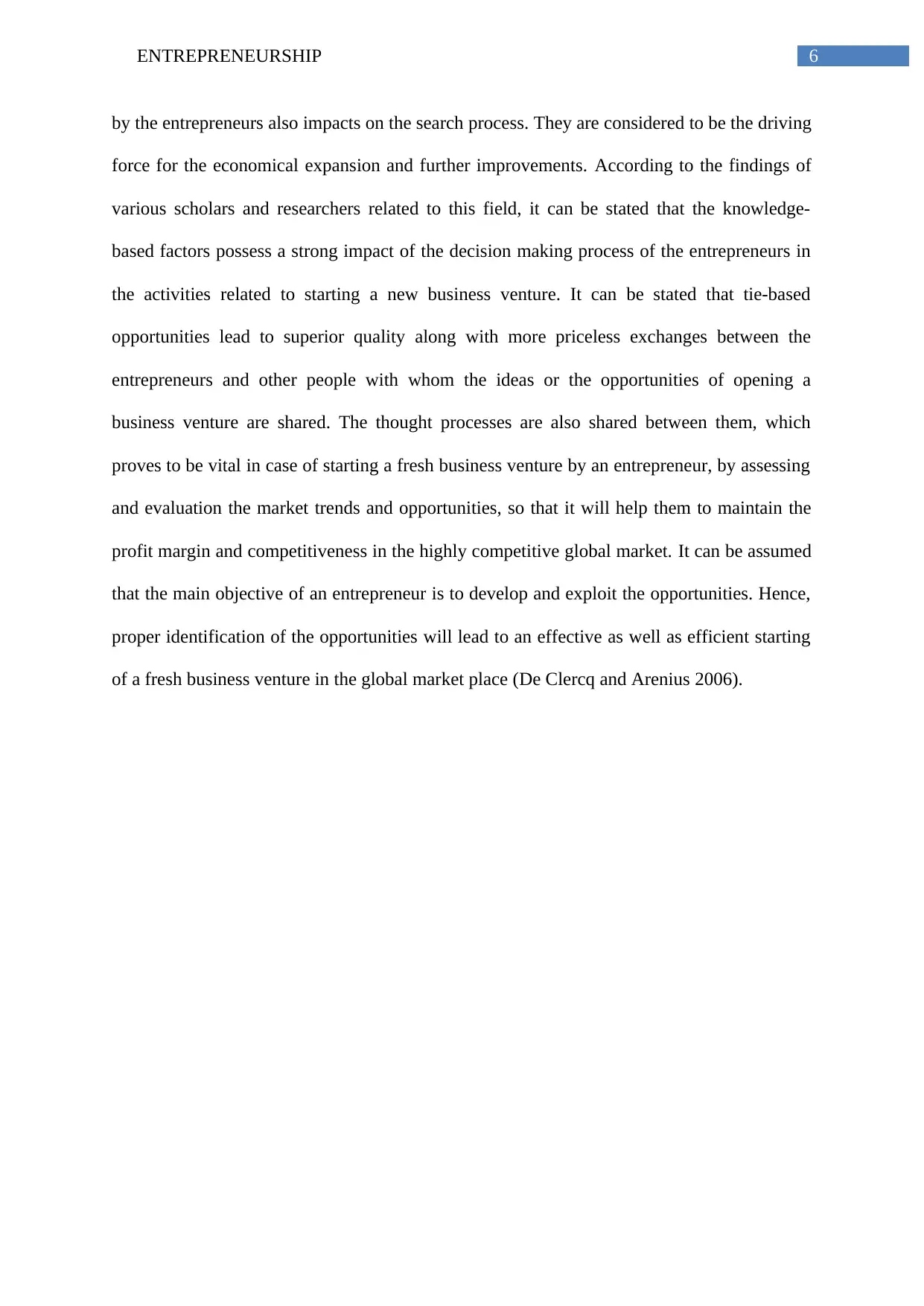
6ENTREPRENEURSHIP
by the entrepreneurs also impacts on the search process. They are considered to be the driving
force for the economical expansion and further improvements. According to the findings of
various scholars and researchers related to this field, it can be stated that the knowledge-
based factors possess a strong impact of the decision making process of the entrepreneurs in
the activities related to starting a new business venture. It can be stated that tie-based
opportunities lead to superior quality along with more priceless exchanges between the
entrepreneurs and other people with whom the ideas or the opportunities of opening a
business venture are shared. The thought processes are also shared between them, which
proves to be vital in case of starting a fresh business venture by an entrepreneur, by assessing
and evaluation the market trends and opportunities, so that it will help them to maintain the
profit margin and competitiveness in the highly competitive global market. It can be assumed
that the main objective of an entrepreneur is to develop and exploit the opportunities. Hence,
proper identification of the opportunities will lead to an effective as well as efficient starting
of a fresh business venture in the global market place (De Clercq and Arenius 2006).
by the entrepreneurs also impacts on the search process. They are considered to be the driving
force for the economical expansion and further improvements. According to the findings of
various scholars and researchers related to this field, it can be stated that the knowledge-
based factors possess a strong impact of the decision making process of the entrepreneurs in
the activities related to starting a new business venture. It can be stated that tie-based
opportunities lead to superior quality along with more priceless exchanges between the
entrepreneurs and other people with whom the ideas or the opportunities of opening a
business venture are shared. The thought processes are also shared between them, which
proves to be vital in case of starting a fresh business venture by an entrepreneur, by assessing
and evaluation the market trends and opportunities, so that it will help them to maintain the
profit margin and competitiveness in the highly competitive global market. It can be assumed
that the main objective of an entrepreneur is to develop and exploit the opportunities. Hence,
proper identification of the opportunities will lead to an effective as well as efficient starting
of a fresh business venture in the global market place (De Clercq and Arenius 2006).
Paraphrase This Document
Need a fresh take? Get an instant paraphrase of this document with our AI Paraphraser
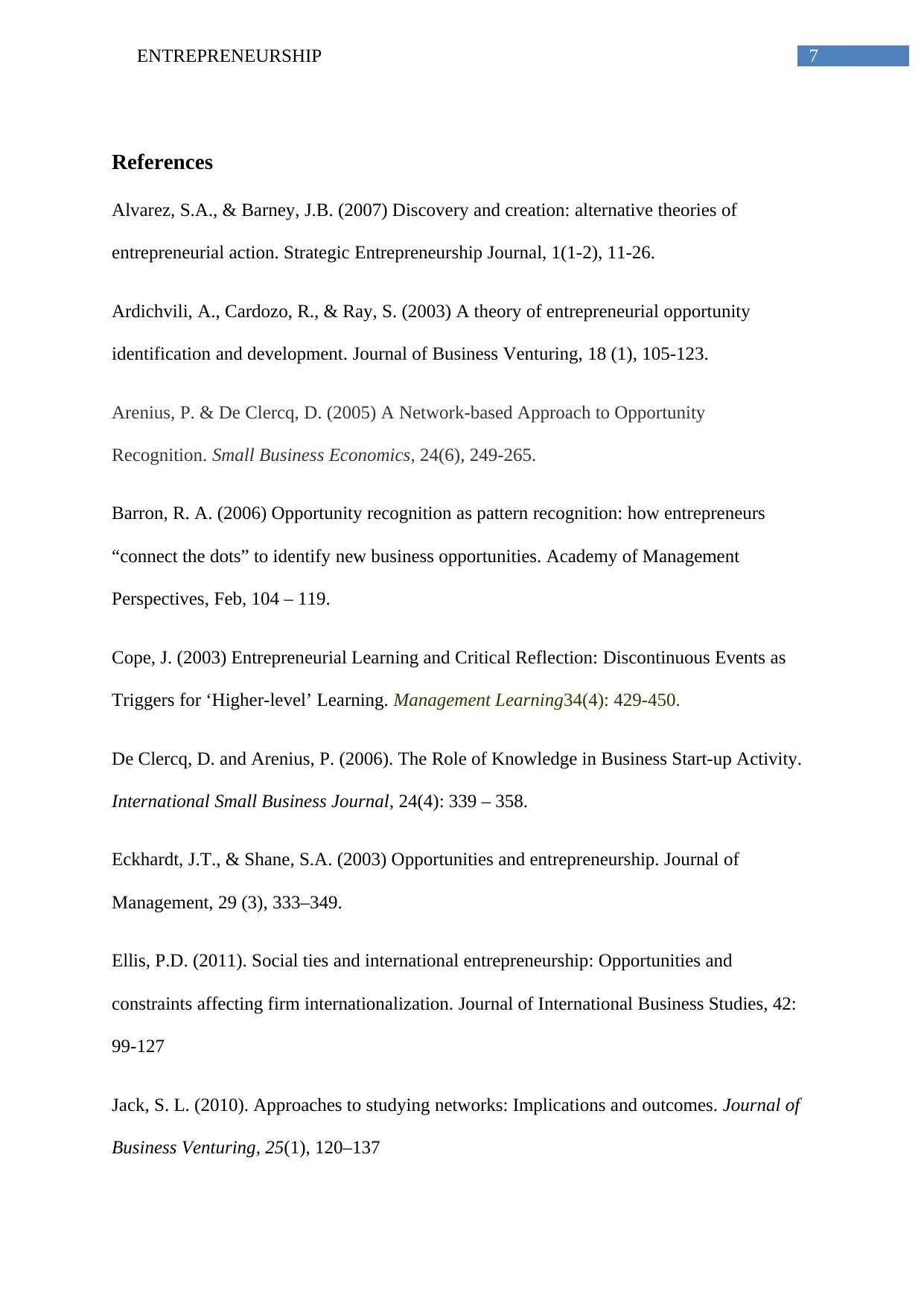
7ENTREPRENEURSHIP
References
Alvarez, S.A., & Barney, J.B. (2007) Discovery and creation: alternative theories of
entrepreneurial action. Strategic Entrepreneurship Journal, 1(1-2), 11-26.
Ardichvili, A., Cardozo, R., & Ray, S. (2003) A theory of entrepreneurial opportunity
identification and development. Journal of Business Venturing, 18 (1), 105-123.
Arenius, P. & De Clercq, D. (2005) A Network-based Approach to Opportunity
Recognition. Small Business Economics, 24(6), 249-265.
Barron, R. A. (2006) Opportunity recognition as pattern recognition: how entrepreneurs
“connect the dots” to identify new business opportunities. Academy of Management
Perspectives, Feb, 104 – 119.
Cope, J. (2003) Entrepreneurial Learning and Critical Reflection: Discontinuous Events as
Triggers for ‘Higher-level’ Learning. Management Learning34(4): 429-450.
De Clercq, D. and Arenius, P. (2006). The Role of Knowledge in Business Start-up Activity.
International Small Business Journal, 24(4): 339 – 358.
Eckhardt, J.T., & Shane, S.A. (2003) Opportunities and entrepreneurship. Journal of
Management, 29 (3), 333–349.
Ellis, P.D. (2011). Social ties and international entrepreneurship: Opportunities and
constraints affecting firm internationalization. Journal of International Business Studies, 42:
99-127
Jack, S. L. (2010). Approaches to studying networks: Implications and outcomes. Journal of
Business Venturing, 25(1), 120–137
References
Alvarez, S.A., & Barney, J.B. (2007) Discovery and creation: alternative theories of
entrepreneurial action. Strategic Entrepreneurship Journal, 1(1-2), 11-26.
Ardichvili, A., Cardozo, R., & Ray, S. (2003) A theory of entrepreneurial opportunity
identification and development. Journal of Business Venturing, 18 (1), 105-123.
Arenius, P. & De Clercq, D. (2005) A Network-based Approach to Opportunity
Recognition. Small Business Economics, 24(6), 249-265.
Barron, R. A. (2006) Opportunity recognition as pattern recognition: how entrepreneurs
“connect the dots” to identify new business opportunities. Academy of Management
Perspectives, Feb, 104 – 119.
Cope, J. (2003) Entrepreneurial Learning and Critical Reflection: Discontinuous Events as
Triggers for ‘Higher-level’ Learning. Management Learning34(4): 429-450.
De Clercq, D. and Arenius, P. (2006). The Role of Knowledge in Business Start-up Activity.
International Small Business Journal, 24(4): 339 – 358.
Eckhardt, J.T., & Shane, S.A. (2003) Opportunities and entrepreneurship. Journal of
Management, 29 (3), 333–349.
Ellis, P.D. (2011). Social ties and international entrepreneurship: Opportunities and
constraints affecting firm internationalization. Journal of International Business Studies, 42:
99-127
Jack, S. L. (2010). Approaches to studying networks: Implications and outcomes. Journal of
Business Venturing, 25(1), 120–137

8ENTREPRENEURSHIP
Klein, P.G. (2008) Opportunity discovery, entrepreneurial action, and economic
organization. Strategic Entrepreneurship Journal, 2(14), 175-190.
Klein, P.G. (2008) Opportunity discovery, entrepreneurial action, and economic
organization. Strategic Entrepreneurship Journal, 2(14), 175-190.
⊘ This is a preview!⊘
Do you want full access?
Subscribe today to unlock all pages.

Trusted by 1+ million students worldwide
1 out of 9
Related Documents
Your All-in-One AI-Powered Toolkit for Academic Success.
+13062052269
info@desklib.com
Available 24*7 on WhatsApp / Email
![[object Object]](/_next/static/media/star-bottom.7253800d.svg)
Unlock your academic potential
Copyright © 2020–2026 A2Z Services. All Rights Reserved. Developed and managed by ZUCOL.





